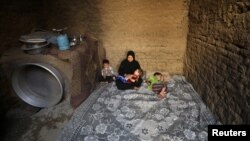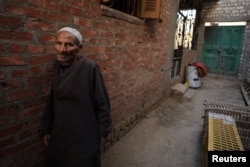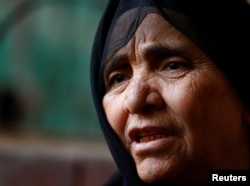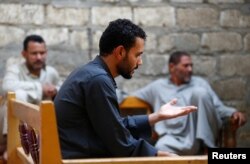In a bare room with nothing but a small pillow, a few pots and a sheet to cover the dusty floor, Youssef Abdullah's family was living in an impoverished Upper Egyptian village when they were told he'd died in the Libyan desert.
Abdullah was one of at least 22 Egyptians found dead this month, perishing from heat and starvation after trekking through the Libyan desert by foot in search of jobs they could not secure at home.
"Youssef's circumstances were very bad. If he found work here, he wouldn't have traveled. I wish I had stopped him but I wasn't able to. ... He traveled without me knowing," his father, Abdullah Mahmoud, told Reuters.
The Libyan Red Crescent said the bodies were found in the Jaghbub desert, 400 kilometers (250 miles) south of Tobruk.
Many of them came from villages in Minya, an impoverished province south of Cairo, where residents say poverty and unemployment have been driving villagers to put their lives at risk to find work of any kind, even if it means contending with the lawless chaos of Libya's civil war.
'As bad as it gets'
Egypt last year began sweeping economic reforms as part of a three-year $12 billion International Monetary Fund loan program, floating its pound currency and slashing subsidies in a bid to lure back foreign investment that fled after its 2011 uprising.
But the measures have pushed inflation above 30 percent and slashed purchasing power.
"Conditions are as bad as it gets," said Abdullah's mother.
Abdullah made about 50 pounds ($2.70) a day working as a farmer, but that work was not available every day.
Before Libya descended into civil war, Abdullah's brothers had traveled there for work, returning with enough money to build a modest two-story brick home.
When Abdullah was unable to come up with the money to build his own, he decided he, too, would go to Libya.
To get to Libya, Abdullah and others from his neighborhood paid a broker from a nearby village, who took money in exchange for providing what he said was legal passage, the families Reuters spoke to said. He then passed them on to smugglers who left them in the Libyan desert without water or food.
The broker, who charged 5,000 to 7,000 Egyptian pounds for the service, remains free. Residents said he threatened revenge if they reported him to authorities.
Among the other victims was Ibrahim Abushusha, 26, who worked as a day laborer and had married just six months earlier.
'Blood dealers'
His brother Khalid, who himself returned from Libya when security there deteriorated, described the migrant brokers as "traders of lives" and "blood dealers." He warned Ibrahim not to deal with them.
"People pay 7,000 pounds to head off to Libya ... in order to die. ... After Ibrahim died, the broker spoke to his father and told him, 'Prepare the money, your son arrived,' " Khalid said.
"Why do young people travel like this and throw themselves into the fire? It's because they don't find anything here. There are no job opportunities making them stay," he added.
Though official unemployment figures show the jobless rate at around 12 percent, young people remain disproportionately affected by the job shortage, which economists say is likely to be much higher in reality.
President Abdel-Fattah el-Sissi has pledged to reduce joblessness to 10 percent over the next few years, but economists say that would take higher economic growth.
Among the survivors was Said Abdullah, who dug his 17-year-old son a grave by hand in the desert after he died.
Samir, Abdullah's brother, described what happened as human trafficking, the result of the poor getting even poorer because of economic austerity.
"The state is not helping the people ... the rising prices that we are dealing with. Every so often they tell you, 'Just wait another six months,' and then prices go higher again," he said.
Family members of victims said they were unable to obtain official death certificates, which they need to apply for social security.
"The state is supposed to help us in getting the death certificate. But they don't help us in death or in life," Samir said.
Migration Ministry's plan
Egyptian Migration Minister Nabila Makram said in a statement last week that the deaths were "tragic, unfortunate and painful and speak to the danger of illegal immigration."
"The ministry is combating illegal immigration by seeking to provide training, rehabilitation and employment opportunities for young people from the poorest provinces with the most emigration," the statement said.
Egyptian authorities have issued scores of warnings against travel to Libya, but Egyptians often do not take the advice.
Despite the deaths, youths are still undertaking the journey or considering the prospect.
When Mohammed Jamal, 26, an unemployed relative of Youssef Abdullah, was asked whether he would travel to Libya if given the chance, he said: "Of course."
"[But] if I found a job and a decent life ... why would I leave?"









